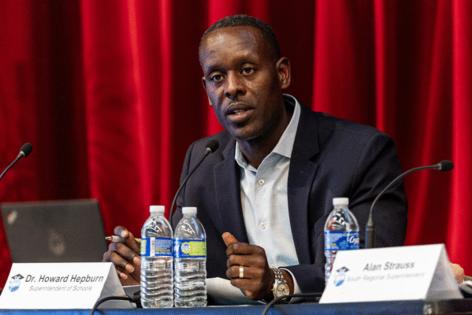Months after cellphone ban, school board in Florida discusses walking it back
Published in News & Features
MIAMI — Broward County Public School students and parents have mixed reactions to the first few months of the district’s policy banning most cellphone use. The school board is split too, but declined to make any changes.
Board members discussed the data from a survey sent to parents, students and teachers in October about how effective the cellphone policy has been so far and whether changes need to be made during a workshop meeting Wednesday morning. Members focused on whether students should be allowed to use their phones during lunch and study hall periods, which is prohibited under the current policy.
Four board members were not in favor of allowing cellphone use during lunch. Three were in favor, and two did not weigh in. The board did agree to prepare a data collection plan to further analyze the policy.
“As much as people want to say change is hard, making that decision that we made in July to go bell-to-bell with specific policy for cellphone use was not hard,” said board member Allen Zeman, who argued that the current policy should not be changed. “Implementing that change is hard. We are implementing today.”
The district’s policy, which expands on a 2023 state law that bans cellphones in class unless required for instructional purposes, took effect on the first day of school on Aug. 12. Phones must either be turned off or on airplane mode, even during breaks.
Survey data presented during the meeting by BCPS Equity, Diversity & School Climate director Jodi Washington highlighted praise and concerns from parents, students and teachers about the policy. While most surveyed teachers reported that the policy has had a positive impact on student’s learning experience, the data also pointed to some gripes about inconsistent rule enforcement.
About 27,800 middle and high school students, 39,400 parents and 6,000 staff members responded to the survey.
The survey responses were generally mixed, especially when respondents were asked about whether the policy had a positive or negative impact on students’ learning experiences. Most surveyed students reported the policy either had a negative or no impact. Most parents said the policy had a positive or no impact.
Perhaps unsurprisingly, according to the data, staff and parents largely agreed with restricting student device use during the school day and students overwhelmingly disagreed. When asked about concerns about the policy, most student and parent respondents said they were worried about safety and being able to communicate with family.
Students and many parents particularly disapproved of cellphone restrictions during lunch.
Landyn Spellberg, the BCPS student adviser, said many students say there’s “major inequity” in how the policy is implemented. In some cases, Spellberg said, students have reported that despite the district’s instructions, some teachers have been told that cellphones cannot be used at all.
“It feels like this policy was pushed out without, one, hearing from the student perspective, and two, recognizing the impact that phones have positively on the student experience,” Spellberg said.
He argued for the board to allow students to use their phones at lunch, adding that students that are taking college-level courses have told him the policy has put a strain on their academics since they can’t use their phones to study, communicate with dual-enrollment teachers or access certain resources.
“I think there is a balance with this policy. You may ask a student, ‘Are you opposed to cell phones at school?’ and pretty much everybody is going to say, ‘We think we should have our phones,’” he said. “But I think if you talk to a lot of students, they have seen the benefits of this policy in class time. I don’t really think there are negatives to this policy during class time.”
School board member Debra Hixon said she was opposed to the lunchtime restrictions. Some principals have told her they don’t even bother trying to implement the rule during lunch because it’s too difficult to enforce, Hixon said. Board member Jeff Holness was also skeptical on how beneficial it was to restrict phone use during lunch and study hall periods where not all students have access to school computers.
“It’s their lunch time,” she said. “We would not expect adults to go all day long without their cellphones. We would not be able to function.”
But not all board members were convinced. Board member Sarah Leonardi and Superintendent Howard Hepburn said it is too early to make changes to the policy based on limited data and anecdotes. Zeman cautioned against “flip flopping” on the policy in the middle of the school year.
Hepburn said the policy needs to go through an entire school year before staff can collect data on how it impacted student performance, education and mental health. Then, he said, changes may be made.
“Many of our students have had cell phones since birth or when they were toddlers,” he said.
_________
©2024 Miami Herald. Visit miamiherald.com. Distributed by Tribune Content Agency, LLC.







Comments